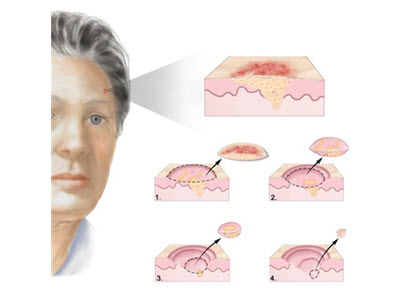Skin cancer
Skin cancer is the most common of all cancer types in the Netherlands. There are different forms of skin cancer. The most common form of skin cancer observed is basal cell carcinoma. Other known forms of skin cancer are squamous cell carcinoma and melanoma.
The chance of getting one or more skin cancers throughout life is about 1 in 6. Basal cell carcinoma is based on cells that are present at the top of the skin. The main cause is sunburns, even in childhood. Too much sun exposure over many years also increases the risk of developing skin cancer. The cells in the skin are irreparably damaged , which can cause skin cancer.
Very often, skin cancer can be treated well with skin cancer surgery. Mohs surgery treatment is often used for skin cancer on the head.
Basal cell carcinoma
There are different forms of basal cell carcinoma. There are also different types of basal cell carcinoma. It may look like a pink or skin-colored bump, which is often shiny. This is classic for “nodular” basal cell carcinoma. The “spirited” basal cell carcinoma can appear in different ways and can often be difficult to distinguish from the surrounding normal skin. It is usually a bit flatter, may have crusts and a little shine. If you look closely and pull the skin tight, you can clearly see skin changes. Basal cell carcinoma often does not cause any symptoms in the beginning. At some point it can present itself as a wound that won’t heal or an easily bleeding spot. If you suspect skin cancer, it is wise to see a doctor. .
Mohs surgery treatment
The most effective treatment for skin cancer is to cut it out. The simple, non-complex basal cell carcinomas are removed with a normal excision. The lesion is cut out, taking a margin of normal skin around the skin cancer, and then immediately closed. The tissue is still sent for examination to see if the skin cancer has been completely removed and the results are usually known within 2 weeks.
For more complex basal cell carcinomas on the face, such as larger tumors that are in an awkward spot or that have a more aggressive growth pattern, Mohs surgery is the best treatment option. Healthy tissue is not removed unnecessarily and you have already received a message on the day itself that the skin cancer has been completely removed.
If certain conditions are met, the Mohs surgery treatment will be reimbursed by the health insurer. This applies to tumors that occur in the so-called H-zone; on and around the nose, lips, eyelids and ears. Larger tumors, often with an aggressive growth pattern, also qualify. Mohs surgery also preferably treats recurrent tumors (that have come back in the same place after previous treatment) and basal cell carcinomas that were not completely removed during a previous excision.
Treatment of Mohs surgery in the Roosevelt clinic
Skin cancer surgery is performed in the Roosevelt clinic. The treatments are performed on an outpatient basis under local anaesthetic. In Mohs surgery treatment, the skin cancer is narrowly removed. This is done in a special way so that the edges can be fully assessed for the presence of skin cancer. The patient goes to the waiting room with a temporary bandage. After the tissue that has been removed has been frozen and sliced, it is viewed under the microscope. If residual tumor is seen, tissue is removed again. Only when all skin cancer has been removed is the wound closed. The technique used for this depends on the size and location of the wound. More information about how the Mohs treatment works and a patient brochure can be found on this page .
At the Roosevelt Clinic, skin cancer treatments, including Mohs surgery, are performed by experienced dermatologists who specialize in skin cancer and skin cancer surgery. The Roosevelt clinic is affiliated with the skin cancer center of the LUMC.
